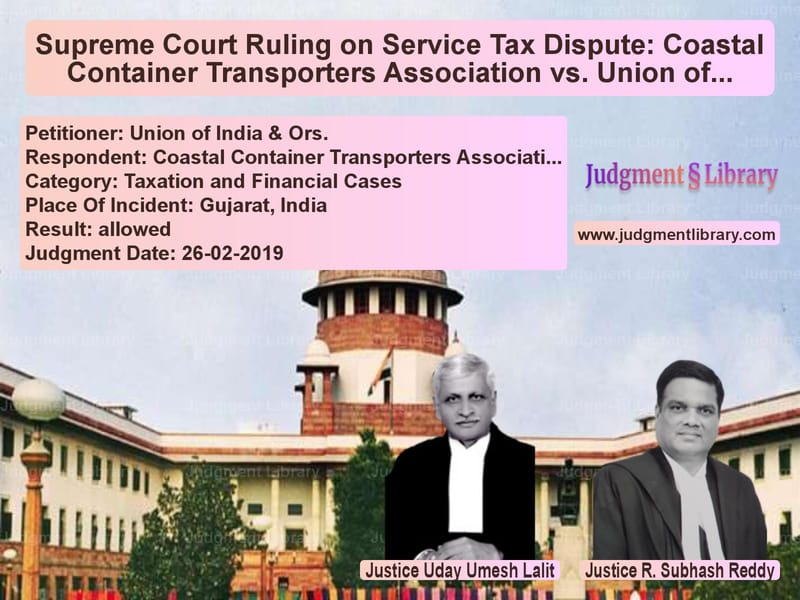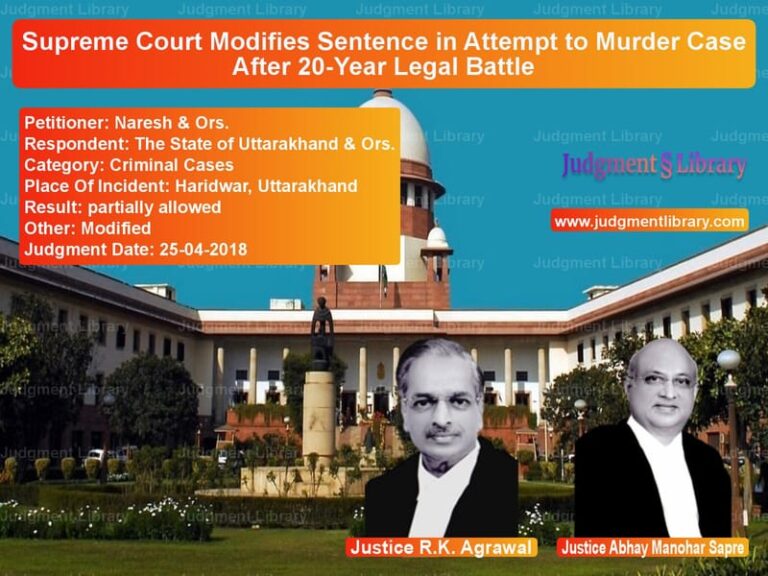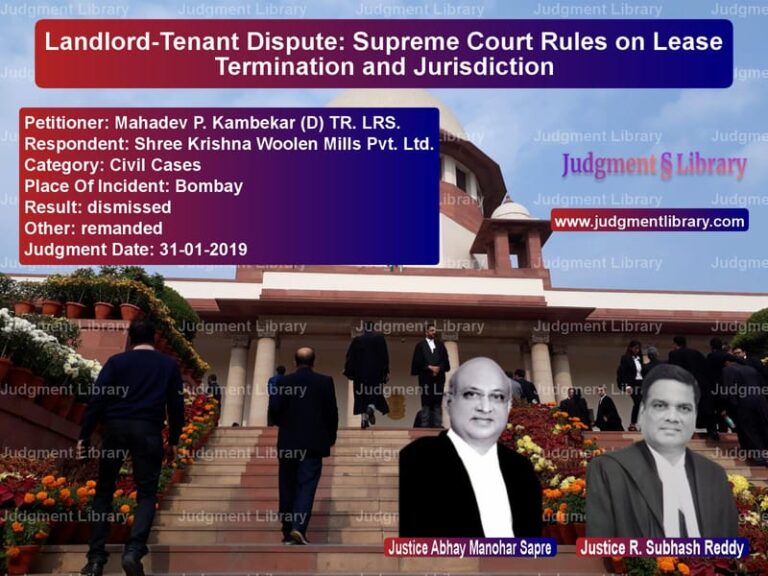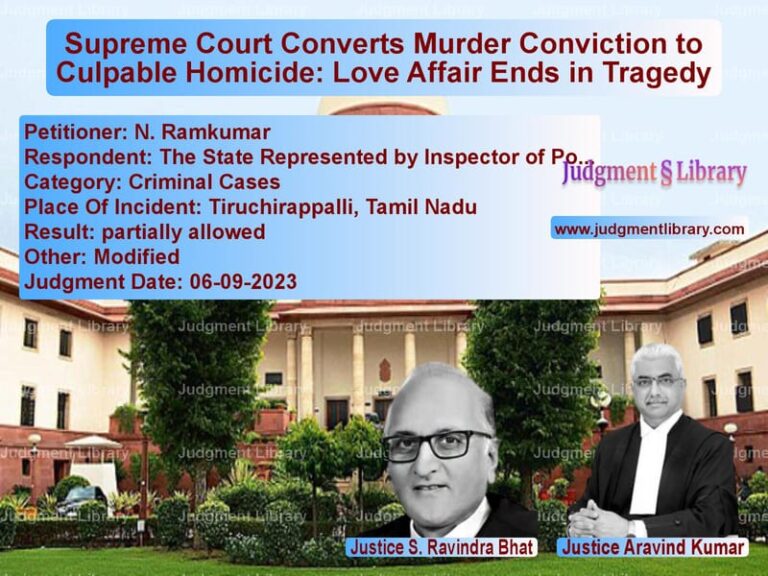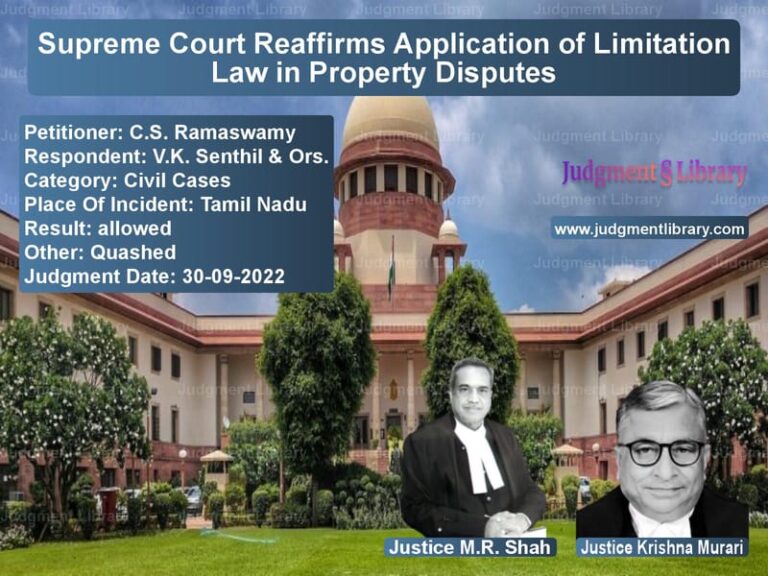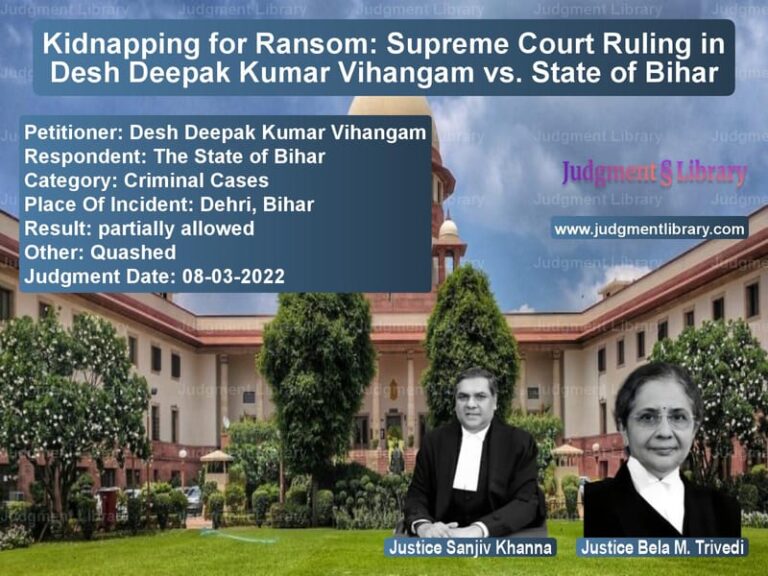Supreme Court Ruling on Service Tax Dispute: Coastal Container Transporters Association vs. Union of India
The Supreme Court in Union of India & Ors. vs. Coastal Container Transporters Association & Ors. addressed a contentious issue concerning the classification of services under the Finance Act, 1994. The case revolved around whether the transportation services provided by the respondents should be classified as ‘Cargo Handling Service’ or ‘Goods Transport Agency’ (GTA). The dispute emerged when the Union of India issued show cause notices demanding service tax under ‘Cargo Handling Service’, which the respondents challenged before the Gujarat High Court.
Background of the Case
The respondents, engaged in the transportation of goods through road networks, contended that they were incorrectly classified under ‘Cargo Handling Service’. They maintained that their primary function was road transportation and that they did not provide auxiliary handling services such as loading and unloading, which are typically included under ‘Cargo Handling Service’.
Key events leading to the Supreme Court appeal:
- The respondents were issued show cause notices by the Central Board of Indirect Taxes and Customs (CBIC) in 2015, demanding service tax under ‘Cargo Handling Service’.
- They approached the Gujarat High Court, which quashed the notices, ruling that the classification of their service as ‘Cargo Handling Service’ was erroneous.
- The Union of India filed an appeal in the Supreme Court, arguing that the High Court had prematurely intervened without allowing the proper adjudication process.
Legal Issues Raised
The case presented significant legal questions:
- Whether the Gujarat High Court had erred in quashing the show cause notices at a preliminary stage.
- Whether the services provided by the respondents fell under ‘Cargo Handling Service’ or ‘Goods Transport Agency’.
- The applicability of CBEC circulars in determining tax liability and service classification.
Petitioner’s Arguments
The Union of India, represented by the Solicitor General, contended:
- The Gujarat High Court had overstepped its jurisdiction by quashing the show cause notices without allowing the tax authorities to complete adjudication.
- The respondents engaged in more than mere transportation; they provided additional handling services, making them liable under ‘Cargo Handling Service’.
- CBEC circulars cited by the respondents were not applicable, as they pertained to a different category of transporters.
- The purpose of classification is to ensure uniform taxation, and interpreting the law differently would lead to revenue losses.
Respondent’s Arguments
The Coastal Container Transporters Association and others, represented by senior counsel, argued:
- Their services were limited to transportation and did not involve handling, storage, or warehousing, which are prerequisites for ‘Cargo Handling Service’.
- The demand for service tax under ‘Cargo Handling Service’ was in direct contradiction with past CBEC clarifications.
- The Union of India was attempting to retrospectively impose a new classification, which was impermissible.
- The Gujarat High Court had correctly exercised its power under Article 226 to quash arbitrary tax demands.
Supreme Court’s Observations
The Supreme Court bench, comprising Justice Uday Umesh Lalit and Justice R. Subhash Reddy, analyzed the legislative intent behind service tax classification.
“The High Court should not have interfered at the stage of show cause notices, as the respondents had a clear statutory remedy of replying to the notices and contesting the demand before the tax authorities.”
Key observations:
- Judicial intervention at the show cause notice stage should be exercised cautiously and only in exceptional cases.
- The classification of services is a matter for the tax authorities to decide based on evidence and industry practices.
- CBEC circulars provide guidance but do not have overriding authority over statutory provisions.
- The respondents had an opportunity to respond to the notices, which they did not exhaust before approaching the High Court.
Final Judgment
The Supreme Court ruled:
- The Gujarat High Court erred in quashing the show cause notices prematurely.
- The matter should have been decided through the statutory adjudication process.
- The show cause notices were reinstated, and the respondents were directed to file replies within four weeks.
- The tax authorities were instructed to decide the classification issue within six months.
Conclusion
This ruling reinforces the principle that tax disputes should be resolved through adjudication before judicial intervention. It upholds the importance of allowing tax authorities to determine service classifications, ensuring consistency in tax administration. The decision also clarifies the application of CBEC circulars, emphasizing that they serve as guidance rather than law.
Petitioner Name: Union of India & Ors..Respondent Name: Coastal Container Transporters Association & Ors..Judgment By: Justice Uday Umesh Lalit, Justice R. Subhash Reddy.Place Of Incident: Gujarat, India.Judgment Date: 26-02-2019.
Don’t miss out on the full details! Download the complete judgment in PDF format below and gain valuable insights instantly!
Download Judgment: Union of India & Ors vs Coastal Container Tr Supreme Court of India Judgment Dated 26-02-2019.pdf
Direct Downlaod Judgment: Direct downlaod this Judgment
See all petitions in Income Tax Disputes
See all petitions in GST Law
See all petitions in Tax Evasion Cases
See all petitions in Banking Regulations
See all petitions in Tax Refund Disputes
See all petitions in Judgment by Uday Umesh Lalit
See all petitions in Judgment by R. Subhash Reddy
See all petitions in allowed
See all petitions in supreme court of India judgments February 2019
See all petitions in 2019 judgments
See all posts in Taxation and Financial Cases Category
See all allowed petitions in Taxation and Financial Cases Category
See all Dismissed petitions in Taxation and Financial Cases Category
See all partially allowed petitions in Taxation and Financial Cases Category

